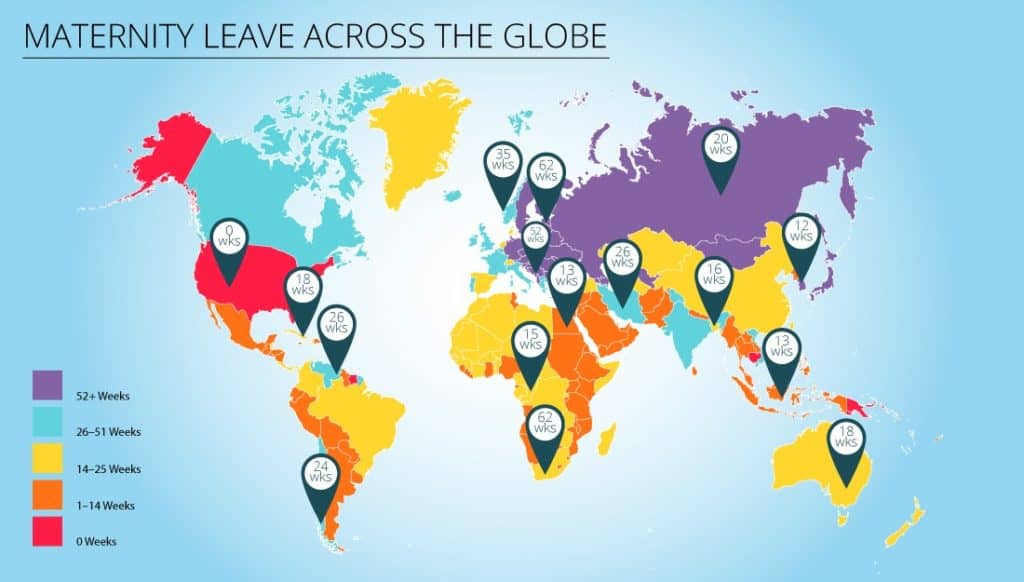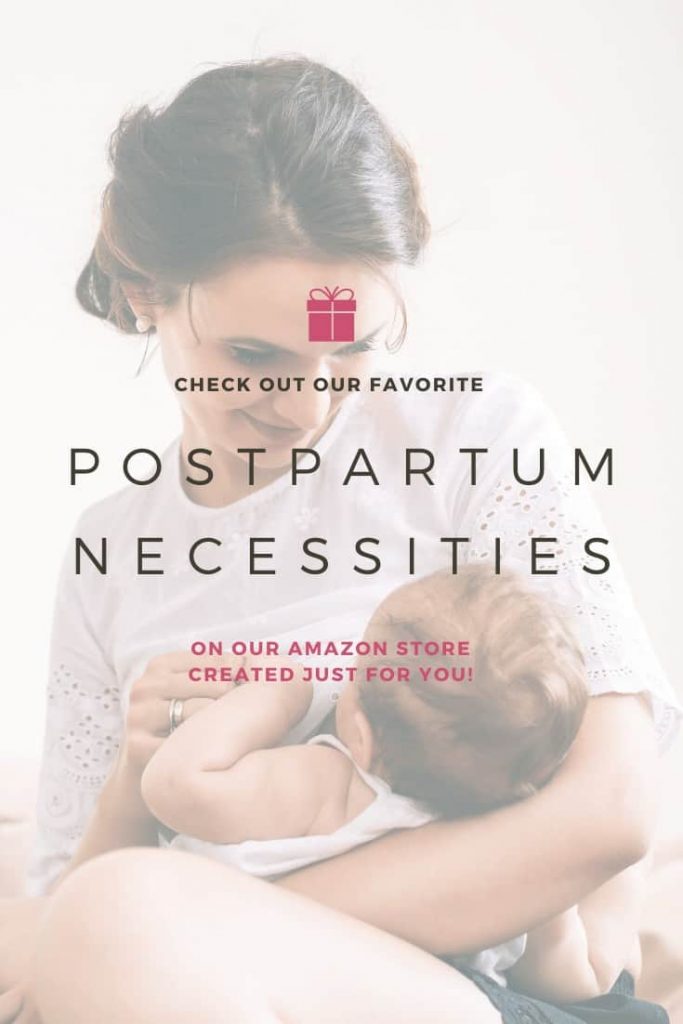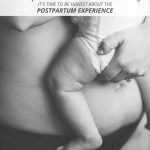Let’s just be honest here, y’all. Even if you had an “easy” birthing experience (I use quotes because, does such a thing really exist?), the postpartum experience is a beast. It’s a period full of emotion, discomfort, sleep deprivation, tenderness, and the realization that you’ve been lied to by your friends and family. A lot. So let’s be honest about the postpartum period, and what it means for you as a new parent.
People tell their birth stories and talk about their pregnancies, but aside from struggles with postpartum body image, we rarely talk about the actual experience of the postpartum period.
I think there’s an evolutionary reason for this silence.

This site contains affiliate links, meaning that we earn a small commission for purchases made through our site. We only recommend products we personally use, love, or have thoroughly vetted.
- Reality of the Postpartum Experience
- What does it mean to be postpartum?
- Maternity Leave Practices Shape Our (Mis)Understandings of Postpartum Recovery
- How long does it take to feel normal after childbirth?
- The Postpartum Period is Really, Stupid Hard
- Let’s Start Being Honest About the Postpartum Experience
- Posts about Postpartum
- Posts for Infant Parents
- Gifts for New Parents
Reality of the Postpartum Experience
In the weeks following labor and delivery, women experience so many changes both physically and emotionally. These weeks after birth are hard, and as your uterus shrinks, your vaginal tear heals, and you struggle with parenting issues like sleep deprivation and how to feed your baby, no one could blame you for sometimes wanting to go back to your pre-baby ways.
But we need our species to exist, so we don’t tell women about these hard realities because we don’t want to scare women away from having babies.
Also, it’s a foggy time, and our brains forget what the postpartum experience is really like. Again, this is probably an evolutionary coping mechanism.
But there are so many things you can do to make the postpartum experiences easier and more meaningful if you just know what to expect.
Here, I’m going to get really honest with you about the reality of the postpartum period, talking about what it means, how long it lasts, and reminding you that you are not alone in struggling with it.
Also remember, it is sweet in many ways. And it doesn’t last forever. It feels long while you’re in it, but so short in the grand scheme of life.
What does it mean to be postpartum?
People often look for a timeline of the postpartum experience, which is hard to provide. Why? Because of discrepancies in medical definitions, birth experiences, and bodily recovery.
Let’s break it up a little.
What is the meaning of “postpartum”?
Let’s talk about the postpartum meaning.
Medically, the postpartum period is the time in which a woman’s body returns to its non-pregnant physiological state. Spoiler alert: I don’t say “pre-pregnancy state” because that may actually never happen. But it’s sweet of you to think it might.
Linguistically, the word “postpartum” derives from the Latin “post” (a prefix we know to mean “after”) and “partum,” the accusative form of “partus,” which means “birth.” Easy enough, right?
Postpartum = after birth.
Socially, “postpartum” refers to the period after birth in which a woman physically recovers and bonds with her child.
Awareness is increasing about issues like postpartum depression and anxiety. Yet still, we tend to glamorize the postpartum period without telling the honest stories of our postpartum experiences.
We ignore the physiological and hormonal changes, the pain, the stitches. On the whole, our society emphasizes maternal/baby bonding far more than the mother’s physical recovery and life-altering identity shift.
Read more about the all-too-common identity crisis after baby here.

In the above photo, which I posted to Facebook during my early postpartum phase, I wore makeup with clean, flat-ironed hair and nice clothes.
I achieved this illusion only because my mom stayed over the night before and kept Jack while husband helped me get ready that morning.
Oh, and I didn’t put the shirt on until right at photo time. Because spit-up.
How long is the postpartum period?
If you Google this question, you’ll get a pretty little box that says in large, bold letters: 6-8 weeks. Based on standard maternity leave practices, it seems most people in the US agree.
Please excuse me while I go laugh and cry.
Let’s learn some basics about women’s health.
When does postpartum start? The postpartum period begins when you give birth. At this point, a woman’s body goes through extreme changes–hormonal shifts that often cause mood swings, physical recovery from vaginal birth or c-section surgery, and organs literally changing size and location.
It’s a lot, y’all.
Not to mention that we have to care for tiny humans, deal with how our bodies do (or don’t) produce milk for them, and pay careful attention to our mental health, looking out for signs of postpartum mood disorder.
Most new moms feel some sort of baby blues. And they hurt physically. And they don’t sleep. And they often don’t eat. Plus they’re usually dehydrated.
So sure, most women will complete the major aspects of postpartum recovery within 6-8 weeks.
But our bodies and lives are going through far greater changes than can be fully accomplished in that span of time. The physiological effects of pregnancy can last months, even years.
Maternity Leave Practices Shape Our (Mis)Understandings of Postpartum Recovery
Standard practice in US businesses, and in short-term disability insurance (which is often used in the US to cover payment during maternity leave) is to provide 6 weeks of maternity leave.
This practice would suggest a postpartum period of only 6 weeks. This is what some researchers call the puerperal phase of the postpartum period, the first of 3 phases.
Others simply call it postpartum.

What is the most critical time of the postpartum period?
The World Health Organization has called the first 6 weeks “the most critical phase” in the lives of new mothers and babies, and yet also “the most neglected period for the provision of quality care.”
If you’re struggling emotionally or physically during your postpartum experience and you’re worried that it’s more than “normal” pain or baby blues, please contact your healthcare provider immediately. (Learn more about postpartum depression and anxiety here.)
Anyone who has given birth knows it takes far longer for your body to feel like your own again. President Bill Clinton’s 1993 signature on the Family and Medical Leave Act (FMLA) could suggest that the US government considers this a 12-week-period.
And yet, a study published in the Harvard Review of Psychiatry found that “39-58% of mothers still have major depression at 3-3.5 years postpartum.”
Some studies indicate the effects of postpartum depression can last for up to 5 years.
For women experiencing the prolonged effects of postpartum recovery, the idea of a 6-12 week postpartum period isn’t just ludicrous; it’s insulting.
How long does it take to feel normal after childbirth?
This is such a complicated question. At 2 1/2 years post childbirth, I still don’t feel like I did before. But I can’t say with any certainty what causes what.
Perhaps some of my exhaustion is due to pregnancy and childbirth. It could also be lifestyle factors, like raising a toddler and running a business.
Or health ones, like an immunodeficiency I’m dealing with (which, again, may or may not be connected to childbirth. The timeline adds up, but the research doesn’t support the claim. So we don’t know.)
Between physical complications following a vaginal birth (which is actually easier to recover from than a c-section), exhaustion, and general recovery (like vaginal healing and organs returning to their usual positions), it took a few months for me to start to feel physically “normal.”
But I’ve honestly never felt the same, physically, since having a child, even when I was in better shape than before.
Online Depictions of the Postpartum Period Distort the Reality of Recovery
Newborn photography, and staged photography in general, show a version of reality that is curated to the point of distortion. This won’t stop me from having family photos taken. I love having photos to look back on that are nostalgic and beautiful.
But we need to be honest about the fact that it’s largely a facade. I spent most of the postpartum period with dirty hair, an unwashed face, in pajamas. (Side note: I’ve made a super helpful list of the BEST postpartum pajamas here.)

I need to be consciously aware of how these images disproportionately frame reality so I can enjoy the photos while also being truthful.
The Katy in the above photo was sleep deprived, exhausted, and debilitatingly anxious. The doting, happy mother the photo depicts is real, but it’s only a partial reality.
It’s the partial reality of Kate Middleton stepping onto the hospital steps in a lovely dress and low heels mere hours after the birth of Prince Louis. Meanwhile, mothers of the world marvel. “How in the world did her beauty team hide the mesh underwear and vaginal ice packs?” (For the days once you’re past the mesh underwear, try these guys for comfort!)

Amy Joyce of The Washington Post pointed out that, “For many, Catherine’s smiling appearance outside St. Mary’s Hospital is just one example of how our culture idealizes childbirth.”
And that’s exactly the problem. Sure, we can all recognize that our lives are different from the Dutchess’s (and I, for one, am very thankful for that), but that knowledge does little to change the fact that such idealizations of the postpartum experience make many women feel inadequate, as if their bodies are failing them.
So let’s be really honest here.
The Postpartum Period is Really, Stupid Hard
Sure, postpartum is beautiful and a bonding period. It’s also hard, ugly, sleepless, confusing, and painful.
After birth, most of us only share the Kate Middleton version of our photos. Even the hospital photo I shared, while I was makeup-less with hair that hadn’t been washed in 3 days, was curated to show a peaceful, rested, happy hospital stay.

I did not show the trying-to-figure-out-this-damned-wrap, my-arms-can’t-hold-this-baby-any-longer, constantly taking stool softeners, not-yet-graduated-to-the-lightweight-maxi-pads version of myself.

Note: Once you figure out the wrap, it’s great. If you’re overwhelmed by the moby or similar wraps, I loved my Baby K’tan, which you can buy in your size and has a much smaller learning curve. I also hear great things about the ring sling.
And I definitely did not show the dirty-hair, haven’t-showered-in-days, holding-and-soothing-a-baby-while-pumping, still-in-mesh-panties, constantly-engorged, regularly seeing a lactation consultant version of myself.

Let’s Start Being Honest About the Postpartum Experience
Recovering from having a baby is hard work, and it’s work you aren’t conscious your body is doing.
The physiological changes during the early postpartum period were, for me, often debilitating.
I’ve started a habit of taking a postpartum supply kit to every baby shower I attend now, just to make the new mom’s life a little easier by giving her all the gross things she doesn’t know she needs yet.
Gross things, you say?
Let me tell you a story.
I was sitting on my couch, plugged into my breast pump, when I suddenly doubled over in pain. I ripped out the pump tubes, spilled milk all over the rug, crawled to my bedroom, and moaned for Husband to come help me.
He brought my phone, and I called the on-call doctor at my OB’s office and could barely get words out through the pain.
She insisted I was experiencing gas, but I knew this was much, much different. She told me, though, that if it wasn’t gas, I’d need to go straight to the emergency room. Not sure how to manage that with a 4-day-old, and scared out of my mind, I pretended to be on board with the gas idea.
I promised to follow her instructions and call her back.
1 laxative suppository, 45 minutes, and the fortunate passing of a giant blood clot later, we assured each other that all was fine and I went to sleep.
So Many Types of Pain
Until I woke up with more debilitating pain.
To the point that I couldn’t get my crying baby.
I couldn’t walk, stand, pump, or sleep.
I took a Percocet given to me in the hospital and still lay awake all night writhing in pain.
Husband stayed up all night with Jack. A warm welcome to fatherhood on our mere second night home from the hospital.
First thing in the morning, I asked my mom to take me to the doctor. Thank God for family members being around to help.
I had a double kidney infection with two different types of bacteria, meaning it took 2 separate 10-day cycles of antibiotics to feel fully better.
24 days postpartum until I was no longer infected, clotted, and in pain. And I still had stitches for weeks.
I could tell you to the day when I finally overcame postpartum anxiety, and it wasn’t until Jack was 2 years old.
Postpartum isn’t pretty, y’all
I did not show that honesty before, so I’ll show it now. Postpartum is beautiful, just like all our family newborn photos show.
It’s sweet, gentle, and full of precious, tender moments. But it’s also really, terribly, horribly hard, painful, and gross. It’s full of snuggles you’ll never get back, and fluids you’ll never want back. It comes with tremendous beauty, but let us not pretend that’s the full reality.
Here’s my truth: I spent husband’s entire paternity leave lying on a bed wedge on the couch, asking for Jack to be brought to me so I could feed or snuggle him, often unable to walk from debilitating pain.

I didn’t show you my truth then, but I’ll show you now. Please, show me yours too.
What was toughest about your postpartum journey?

Posts about Postpartum
- Postpartum body image
- Best postpartum pajamas
- How do deal with postpartum anxiety
- What no one tells you about your postpartum body
- Postpartum must haves
- Postpartum sitz bath
Posts for Infant Parents
- How to increase breastmilk supply
- Best books for babies
- Parenting stress
- Identity crisis after baby
- Newborn baby wearing












Love this. Thank you for speaking the truth so many of us are afraid to tell.
Thank you! For reading, for validating, and for making it through with grace even when it doesn’t feel like it.
Yep. I was there! It’s so hard. Beautifully written, as usual!
Thank you for your honesty I wish more people had warned me just how awful it is after. I just gave birth to my first child in February of this year 2019. I tried to go natural but let’s first discuss the epidural that they tried for a hour to get in and them to tell me you have scoliosis or degenerative disc disease (which I had informed them many time I had huge back issues but couldn’t get the MRI needed to find out what was wrong cause surprise I was pregnant) so the epidural after all that work and effort lasted maybe 30 mins because he didn’t get it fully between my discs. So after about 3 hours I got stuck at 8cm so they induced which they don’t warn how fast the contractions will really be and well with basically next to no drugs I was in some serious pain and not feeling very good. My blood pressure dropped as well as the babies twice. I finally got to 9cm and they had me start pushing (now I have fibromyalgia so I am not as flexible as I’d like anymore due to pain) they had me squish myself so much it was painful. They could see his head coming but his heart rate skyrocketed and I had to stop pushing because he was stressing out and they feared tacky cardi I may ot be spelling that right or saying it right. Anyhow I instantly went into anxiety mode, another thing I forgot to mention is I was 3 weeks early and all my family and friends are in NY and I know live in NC. So they weren’t scheduled to be here yet. So as my doctor is telling me we need a emergency csection I panic they at first say my husband can come in then change there mind because there isnt enough time to get him ready. So they wheel me back alone, scared, having a anxiety attack and major contractions one on top of the other. They try to put a face mask on. and I freak out and tell them they have to give me a minute to gather myself, next I know I’m waking up and having difficulty breathing and panic again due to the face mask. Anyhow I finally get to see my son who was that Tues supposedly only 6lbs 14oz turned put to be 9.5!! He had a sugar issue and jaundice so they had to keep him. The pain I felt after they do not at all tell.you about. My husband had to lift me up a d help me sit everywhere I walked or went. I could not climb stairs for over a week so could not return to my home a d had to stay at my in laws since we have 3 flights of stairs. They also do not tell you just how bad it can get. My hormones where so out of control I felt not connect with my child and just wanted to do nothing but sleep. I still am battling depression and anxiety these where a issues prior but have become way more intense now. I still have many days where I sadly wish I could get like a do over and not have done it but then there is times I can’t wait to have another. I think the biggest issue is not having a outlet where I am not having a support team. Yes I got my husband who is amazing and so understanding and his family is just always there but it’s not the same as me having my own friends and family. I know no one where I live that I connect with so I sit home all day alone with a screaming baby. So they dont tell about the truth of birth and more people need to know it’s not all rainbows and sunshine as everyone makes it seem or makes you think you need to be. That for me is the most hardest thing to except that I need time to heal and it’s ok my headspace isn’t right and having to cope with fibromyalgia and back issues. It is ok to be weak and valnarable. I just wish there where better outlets for women in there time of need.
Oh, Tara, I’m so sorry for your awful experience. It sounds like your hospital mishandled SO many things, which unfortunately, isn’t all that uncommon. Then having the recover from the traumatic birth, PLUS full-on labor and surgery on a body that already has issues that cause so much pain–I have no words, just hugs from Atlanta. Please feel free to post on our Facebook page anytime you need an ear–you should find plenty of love and support there! And if you aren’t getting the support you need for your depression and anxiety, please checkout Postpartum Support International for resources and to find a healthcare provider near you. After going through an experience like yours, the last thing you want to do is trust a doctor, but effective counseling, whether it’s with a psychiatrist, psychologist, or counselor, can be life changing. Sending you so much love! – Katy
Thank you so much for this post. It truly helps, I always feel like a crazy person or not a good mom for the way I feel post partum.
January 18th was my due date, and my son still wasn’t making any significant moves. I was getting very ansty for his arrival especially because he is my rainbow baby. My son brought on a PUPS rash that was itchy and painful from my head to toe. Apparently some women will get it if they’re first time mom’s with a boy in tow. My doctor decided that if he doesn’t make his grand appearance then we will be induced on January 25th. I’m so lucky my mom was scheduled to come to town the night before. The pitocin was quick and the contractions came very fast. After a few hours of unimaginable pain I asked for the epidural. Finally it was time to push and I was pushing for 4 hours.. he did not want to come out due to being transverse. My doctor is is a saint said we are going to use the vacuum if that doesn’t work we will have to rush you to surgery. Her patience got me through the delivery vaginally. I was so exhausted I didn’t know what was happening around me, I barely felt my son on me for the first time. I lost a lot of blood due to the delivery. I had post partum hemorrhage. I should’ve gotten a blood transfusion but I kept saying I was fine. I thought I was but wasn’t walking around enough to know if I was ok or not. Once discharged and sent home I have never felt so terrible in my life. They repeated my blood work and saw it was up but not out of the woods yet, so they said to rest and drink a lot of fluids. Oh yeah how easy can that be with a newborn at home? My mom and husband convinced me to feed my son formula at night so he would sleep longer and not depelete me from breastfeeding. I felt like a huge failure. I had one job and it’s to feed my son and I felt like I couldn’t do it. Fast forward to a couple of weeks later to me developing kidney stones where I had to be on medications and needed surgery to remove them. If you think labor is hard, try having a kidney stone that won’t come out (yikes!). Once again I am faced with not being able to feed my son. I had to pump and dump until all my medications where out of my system. I felt a disconnect from him and I blamed him as to why I was never feeling good. I then hated myself for feeling that way to this perfect little rainbow baby. I’m still struggling but each day is getting slightly better. I’m going to therapy and working out. It helps a little. Anyways, I’m sorry for such a long story but it feels good to know I’m not alone with my feelings.
Thank god for this post. I’m over a year post partum and I still have no idea what’s going on with my body sometimes. The post partum anxiety was a very real thing in my household. I was always worried about something and still am. There is bouts of just random emotion still do. I’m waiting for the day it level off, not easier just levels off. I didnt know of anyone to talk to because it seemed like it was t normal.
I’m so sorry you’re still dealing with it! Mine is finally leveling off, and I’m in therapy, on medication, and almost 2 years PP. All that to say, it can be so hard! If you feel like you need help, visit the Postpartum Support International website. They have resources for your area as well as a hotline.
My mom wasn’t there until 3 weeks postpartum which was definitely a challenge for the times my husband was at work. I remember one evening less than a week PP being so overwhelmingly overcome with emotions that my husband ended up having to call a trusted older friend to come who basically told him that he should not go to work the next day. Although he had been given time off it wasn’t much and the pressure was there to go to work. He had to call his boss and tell him his wife needed him and he wasn’t coming to work.
Now I’m 7 months PP. There are days I’m so discouraged. They say raising a child takes a village. And though I have so many wonderful friends and family who love kn me and my son there are days i need help and because my mom lives an ocean away it’s hard to ask for help. I keep thinking: I only have one baby. I’m sooo far past giving birth. My sister in law had a baby after me AND had a toddler. Because of this I’m Not sure how many people actually see that I need help.
I feel almost a hidden expectation to have everything under control.
Oh. And I’m currently writing this at 4 AM after feeding my son while on day 5 of Mastitis. While I’m past the pain and fever and aches I’m currently struggling with really low milk supply thanks to Mastitis. Would never wish it on anyone else. But what an honor to hold this precious life despite the pain physical, emotional, mental and spiritual.
Oh honey, it is an honor, but that doesn’t mean it can’t also be hard! People aren’t honored for valor for doing easy things. Check out last week’s post about mom guilt—maybe it’ll help you with some of the self-comparison with your SIL. Or maybe it won’t, but I hope so. You’re doing such a hard thing, and if you have a village, you do have to ask! People don’t think about sticking around, and I’m as guilty of it as everybody else. But no one will think less of you for asking. Learning to ask is what got me through so many days for so long! (And it’s a handy skill set to have developed in so many other ways.)
This post is right on target. I had my first child March 2019 and let’s just say today is not my day. It’s extremely hard and I have the baby 24/7 for the most part because my husband works…AND we just moved into a new house. I mainly feel sadness when I dont get enough sleep. When my husband was on paternity leave we took shifts each night so that the other person could get rest. There was no point of us both being exhausted at the same time. Now that he’s back at work I’m with the baby all day everyday and it’s extremely overwhelming. Some days I literally want to run away. I’m pushing through this season but man is it hard!
It’s so hard, mama! If you can schedule friends coming to visit while husband works, that really helps! Depending on your budget, I also have a lot of readers who swear by a couple of hours a week of a postpartum doula, but that’s definitely a luxury option. Schedule outdoor time now that it’s spring – the sunshine will help you both! I wish I could fix it, but the reality is that it’s just hard. But I promise it gets better!
I completely agree that the challenges of postpartum life should be talked about, although I strongly believe that this should be done with the goal of helping women have a better experience. A lot of the conversation I hear about the trials of postpartum life don’t really do much to help a mom prepare or problem solve. Yeah, it’s super important to let moms know that it’s normal to not feel good in the postpartum period…that way a mom who has a rough time won’t have guilt! But I’m also cautious of repeating that message so much that women just accept suffering as inevitable without trying to change it.
I was at a very high PPD risk, so I was forced to plan my postpartum life much more than a mentally healthy woman would be. Yes, I was scared of how hard it would be, but I also tried not to see is as inevitable or a rite of passage or “just part of motherhood” because that wouldn’t help me do what I needed to do to protect my mental health. I really believe that the plans I made did help my postpartum period to be much more positive than it otherwise would have been, and I want other women to feel like that’s worth trying for.
So yes, let’s make new moms aware. And then let’s talk through it with them so they can feel good about their preparations for the challenges.
I’d love to hear what types of plans you made that helped so much! We definitely need to provide women with helpful information and ideas for useful plans!